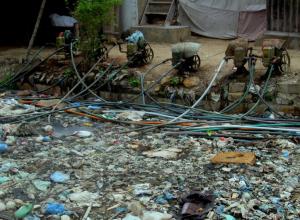WashMedia-South Asia
abdominal pain
-KWSB does not provide water supply connections in slum areas, prompting residents to make illegal connections
-Contaminated water causes diarrhea, vomiting and abdominal pain
-Losses of Rs 112 billion is caused by inadequate water supply, sanitation and hygiene conditions
Monday, 11 Oct 2010

Amar Guriro
KARACHI
At least 28 people living in the slums of Landhi and Korangi towns were hospitalised with diarrhea, vomiting and abdominal pain on Monday after allegedly consuming contaminated water.
They were taken to Landhi Town Hospital and other public and private hospitals of the two towns. Most patients belong to the Sindhi Paro, Bengali Para, Sherpao Colony and Kashmir Colony slums.
The patients told Pakistan Today that as they are settled in the slums, the Karachi Water and Sewerage Board (KWSB) does not provide them water supply connections thinking that the residents will claim land ownership on the basis of the monthly water supply bills. This has prompted the residents to illegally connect pipes to the supply lines, but the water coming through these pipes becomes polluted by the nearby sewage lines.
“There are dozens of slums in Landhi and Korangi towns, where thousands of poor people live, but they are not allowed basic facilities including safe drinking water,” said a resident of the Sherpao Colony, adding that, “Therefore we have no other option but to consume polluted water or buy water from tankers that is also unclean.”
Landhi Town Health Officer Dr Khalid Ghauri told Pakistan Today that diarrhea, vomiting and abdominal pain are common diseases in these areas. “The majority of these patients belong to slum areas where no proper drinking water supply schemes and sanitation systems exist. The people then have to use water that is highly contaminated,” he said.
Research studies conducted by different national and international organisations say that improper sanitation systems, bad hygiene conditions and a lack of clean drinking water are issues faced by millions in Pakistan.
A National Conservation Strategy study reveals that almost 40 percent of the total deaths in Pakistan are due to waterborne diseases. A World Health Organisation report discloses that 32 percent of hospital beds in Pakistan are occupied by patients suffering from waterborne diseases.
Quoting official figures of the Federal Health Department, a research by the Aga Khan University’s National Health Sciences called ‘The Impact of Water and Sanitation on Health: Our Problems, Our Solutions’, states that bad sanitation conditions are not only affecting human health but the environment too and the estimated loss caused by environmental degradation in Pakistan is Rs 365 billion per year. A loss of Rs 112 billion is caused by inadequate water supply, sanitation and hygiene conditions alone.
The level of water contamination in Karachi can be gauged from a recent research conducted by the Pakistan Medical Association (PMA) in which around 600 water samples were collected from taps in Korangi, North Karachi and other towns. The results disclosed that not a single sample was fit for human consumption.
“Most people living in these areas had maggots and bacteria in their stomachs because of an unhealthy environment,” the report says, adding that the residents were also suffering from cholera, hepatitis B and E, diarrhea and other diseases.
The official data of the Sindh ‘Katchi Abadi’ Authority reveals that there are 539 slums in Karachi, making 42 percent of the city’s total population without access to clean water.
Pakistan Today
